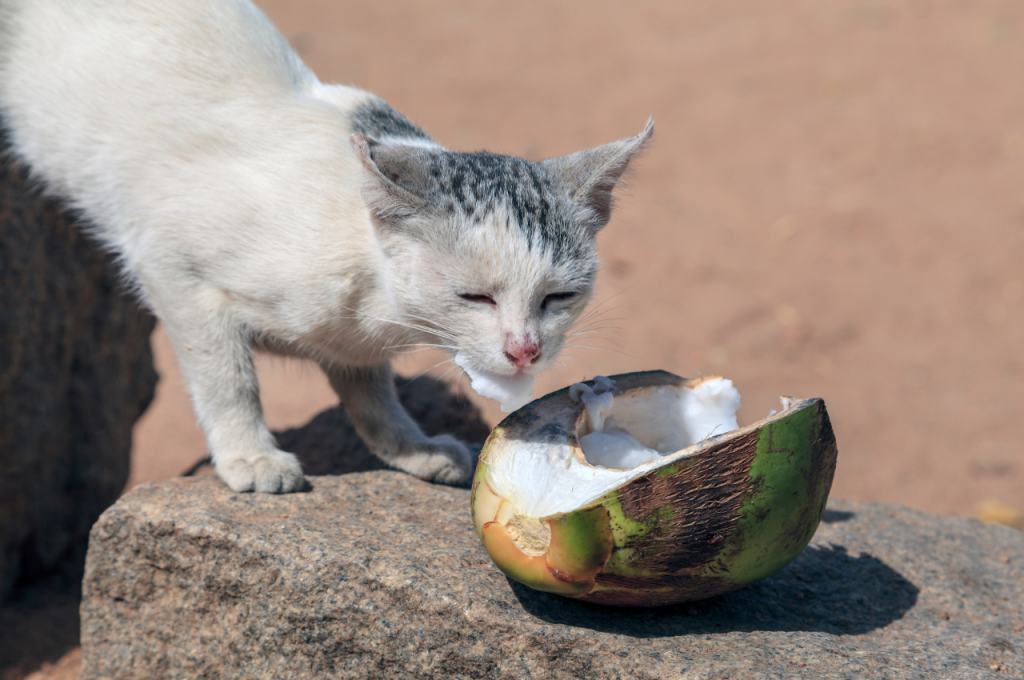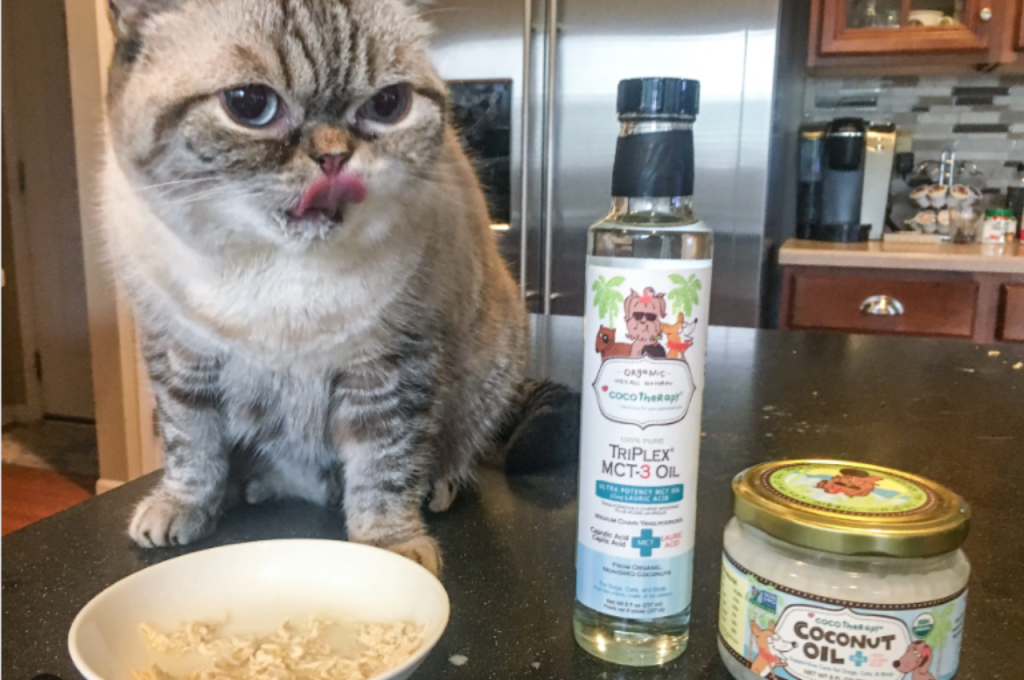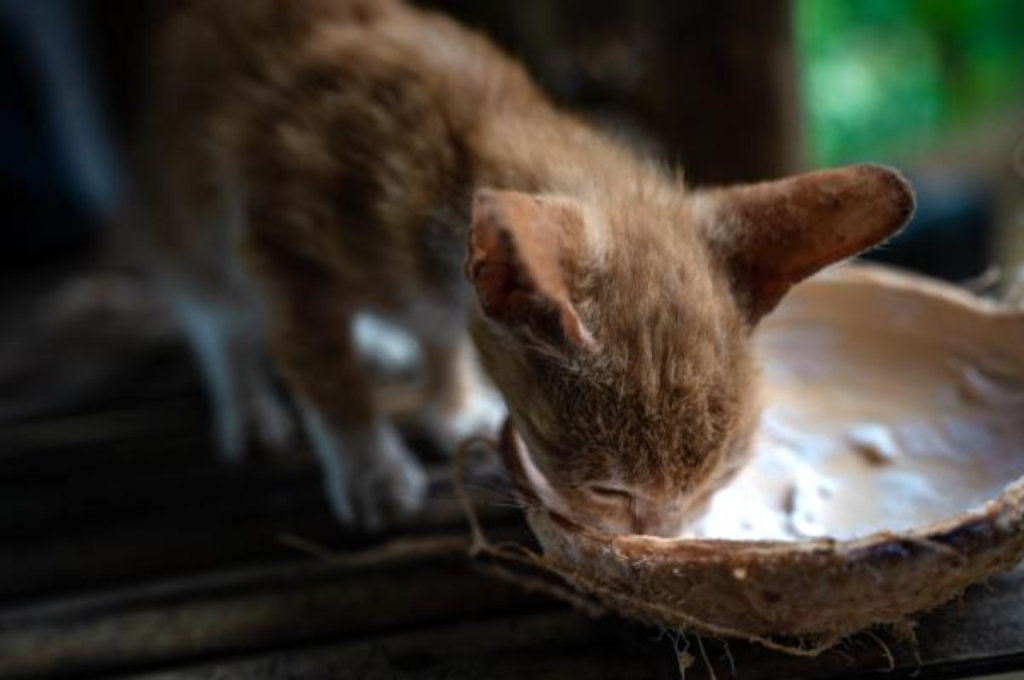Yes, cats can have coconut in small amounts, as it’s not toxic to them. Coconut is safe for cats.
Coconut, a tropical fruit with a distinct flavor, can be offered to your feline friend as an occasional treat. While some cats may enjoy the taste of coconut, it’s important to introduce it gradually to avoid any digestive issues. Coconut oil, in particular, can be beneficial for cats’ skin and coat health when used externally.
However, too much coconut can lead to stomach upset or diarrhea in cats, so moderation is key. Always consult with your veterinarian before introducing any new food to your cat’s diet to ensure it’s safe for their individual health needs.
Can Cats Eat Coconut?
Cats can eat coconut in moderation, but it’s not a necessary part of their diet. Coconut flesh, coconut oil, and coconut milk are the most common forms of coconut that cats may encounter. While some cats may enjoy the taste and texture of coconut, others may not show interest in it at all.

Here are some considerations regarding cats and coconut consumption:
Types of Coconut
Coconut products, including coconut oil, coconut water, and dried coconut flakes, have become increasingly popular in recent years due to their versatility and potential health benefits.
Nutritional Value of Coconut
Coconut is rich in fiber, healthy fats, vitamins, and minerals.
- Contains lauric acid, which supports immune health.
- Low in protein but high in calories and saturated fats.
Potential Benefits of Coconut for Cats
Coconut can aid in digestion, promote a healthy coat, and boost energy levels.
- May help with hairball prevention due to its fiber content.
- Supports skin health and may reduce inflammation.
Risks and Dangers of Coconut for Cats
While coconut is generally safe, some cats may experience digestive issues.
- High-fat content can lead to pancreatitis in sensitive cats.
- Coconut flesh should be given in moderation to prevent weight gain.
Ways to Feed Coconut to Cats
Coconut can be a nutritional addition to your cat’s diet when fed in moderation. Here are some safe ways to incorporate coconut into your feline friend’s meals:
Coconut Oil
- Rich in healthy fats that can promote a shiny coat and aid in digestion.
- Feed in small amounts – start with 1/4 teaspoon per day.
- Can be mixed with food or given directly for its health benefits.
Coconut Water
- A hydrating treat for cats, especially on hot days.
- Ensure it is plain and free of added sugars or artificial flavors.
- Offer in a shallow dish for optimal consumption.
Fresh Coconut Meat
- A source of fiber that can aid in digestion for cats.
- Offer small amounts of finely chopped or grated coconut meat.
- Make sure it is fresh and free from any preservatives.
Coconut Milk and Cream
- Check for additives like xylitol, which can be harmful to cats.
- Feed in moderation due to its high fat content.
- Opt for organic and unsweetened varieties when offering to cats.
Coconut-based Products for Cats
As cat owners, we always strive to provide the best care for our feline friends. And when it comes to their diet, we are often curious about introducing new and nutritious options. Coconut is one such ingredient that has gained popularity for its numerous health benefits in recent years. But can cats have coconut?
Coconut Treats
Coconut treats can be a delightful and healthy addition to your cat’s diet. These treats are usually made with a combination of coconut meat and coconut oil, which are both safe for cats to consume in moderation. Coconut meat is rich in healthy fats and fiber, aiding digestion and maintaining a healthy coat for your furry friend.
When choosing coconut treats for your cat, it’s important to ensure they are specifically designed for feline consumption. Look for treats that are free from added sugars, artificial flavors, and preservatives. Natural and organic options are the best choice to provide your cat with a wholesome treat.
Coconut Supplements
In addition to coconut treats, there are various coconut-based supplements available that can support your cat’s overall well-being. These supplements are usually formulated with coconut oil and other beneficial ingredients to promote a healthy immune system, improve digestion, and maintain optimal skin and coat conditions.

When selecting coconut supplements for your cat, make sure to consult with your veterinarian. They can recommend the most suitable option based on your cat’s specific dietary needs and health concerns. The dosage of the supplement also plays a crucial role, so always follow the recommended guidelines provided by the manufacturer or your veterinarian.
How Much Coconut Can Cats Have?
Cats can have coconut in small amounts as an occasional treat. While coconut can offer certain health benefits for cats, it should be fed in moderation due to its high fat content. Here are some general guidelines for feeding coconut to cats:
Recommended Serving Size
When it comes to feeding your feline friend coconut, it’s essential to do so in moderation. The recommended serving size for cats consuming coconut is around 1 teaspoon of unsweetened coconut meat or coconut oil per day. Excessive intake may lead to digestive issues and is best avoided.
Frequency of Feeding Coconut to Cats
Cats should not be given coconut daily. It’s crucial to consider the frequency of feeding. Offering coconut as an occasional treat, about 1-2 times a week, is considered reasonable. This frequency helps prevent potential digestive upset and allows for a balanced diet.
Signs of Allergies or Intolerance
While coconut is generally safe for cats, there is a possibility of allergies or intolerance. It’s important to be aware of the signs that may indicate a negative reaction to coconut products.
Common Symptoms
Common symptoms of allergies or intolerance in cats may include:
- Skin irritation
- Itching
- Hives
- Swelling
- Upset stomach
- Vomiting
- Diarrhea
If you notice any of these symptoms after giving your cat coconut products, it’s important to take immediate action.
What to Do if Your Cat Shows Signs of Allergies
If your cat shows signs of allergies or intolerance after consuming coconut, here’s what you should do:
- Stop giving your cat coconut products immediately.
- Monitor your cat for any worsening symptoms.
- Consult a veterinarian for advice on how to manage the allergic reaction and alternative dietary options for your cat.
Consulting With A Veterinarian
Consulting with a veterinarian about feeding cats coconut is crucial for ensuring their well-being. While cats can have coconut in moderation, it’s important to consult with a professional to determine if it aligns with their dietary needs. The veterinarian can provide personalized guidance based on the cat’s health status and any potential allergies.
When it comes to the health and well-being of our feline friends, consulting with a veterinarian is of utmost importance. Veterinarians are trusted professionals who have the knowledge and expertise to guide us in making the best decisions for our cats. If you are considering introducing coconut into your cat’s diet, it is crucial to consult with a veterinarian beforehand.
Importance of Veterinary Guidance
Veterinary guidance is essential because each cat is unique and may have individual dietary requirements or health concerns. While coconut can be a safe and healthy treat for some cats, it may not be suitable for others. It is essential to recognize that what may be safe for us humans may not necessarily be safe for our feline companions. Therefore, seeking veterinary guidance is vital to ensure the well-being of our cats.
Discussing Coconut Consumption with Your Vet
When discussing coconut consumption with your vet, it is important to provide them with comprehensive information regarding your cat’s current diet and any existing health conditions they may have. This enables the veterinarian to make an informed decision and provide tailored advice based on your cat’s specific needs.

During the consultation, you can ask your vet about the potential benefits and risks associated with coconut consumption for cats. They can assess whether your cat has any allergies or sensitivities that could potentially be triggered by coconut.
Furthermore, your veterinarian can make recommendations on the appropriate quantity of coconut to give your cat and how often it can be included in their diet. Following their guidance will help ensure that your cat receives the right amount of this delicious treat without any adverse effects.
Frequently Asked Questions for Can Cats Have Coconut?
Sure! Here are some questions about whether can cats have coconut:
1. Can cats eat coconut oil?
Cats can consume coconut oil in small amounts, as it offers potential health benefits. However, it’s important to introduce it gradually to monitor any adverse reactions. Coconut oil should not replace a balanced feline diet, and consulting a veterinarian is crucial before making any dietary changes for your cat.
2. Is coconut milk safe for cats to consume?
Coconut milk is not recommended for cats as it contains high levels of fat, which can lead to digestive issues and obesity. Additionally, some cats may have lactose intolerance, making it difficult for them to digest this dairy alternative. It’s best to stick to feline-specific diet options to ensure their well-being.
3. What are the potential health benefits of coconut for cats?
Coconut can offer certain health benefits for cats, as it contains medium-chain triglycerides that may aid digestion, immune function, and skin health. However, it’s important to offer coconut in moderation and consult a veterinarian to ensure it complements your cat’s diet without causing any adverse effects.
4. Can cats consume raw coconut meat?
Raw coconut meat is not an ideal food for cats, as it can be difficult for them to digest and may lead to gastrointestinal issues. It’s essential to provide cats with a well-balanced diet consisting of feline-specific food and consult a veterinarian before introducing any new food items to their diet.
Conclusion
To summarize, coconut can be a healthy treat for cats in moderation due to its numerous nutritional benefits. Its high fiber content supports digestive health, while the medium-chain triglycerides provide a source of energy. However, it is important to introduce coconut gradually and monitor your cat for any adverse reactions.
Remember, consulting with a veterinarian is crucial before making any dietary changes for your feline friend. So, go ahead and spoil your kitty with a small amount of coconut goodness!
